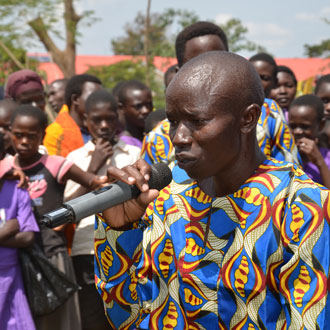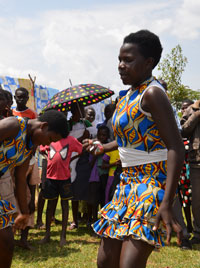In Northern Uganda’s Amolatar District, four young adults are dancing and singing to change the way their community views indoor residual spraying (IRS) and, in turn, improving the overall health of their communities. Known as the International Entertainment Group, this group of four works on the Uganda IRS Project: one as an IRS storekeeper and the other three as spray operators. The project, financed by USAID and DFID/UK encourages the engagement of youth in civil society and economic opportunities.
Anthony Okello, 26 years old, joined the Uganda IRS Project in 2014 as a storekeeper. As a father of two and a village health team member, Okello understood the impact IRS had on malaria transmission. “I was responsible for sending in blood samples for malaria detection,” he said. “Before IRS, seven out of ten cases would be detected as malaria. After IRS, there were only about two or three.” Okello also noted that his children rarely get sick now as they did before spraying was introduced to his home.
Despite the benefits of IRS, Okello noticed that many people in his community had refused to allow their homes to be sprayed. In 2015, a year after working with the project, he decided to write a song about IRS to encourage his community to embrace IRS. “Some community members did not understand the importance of IRS. I thought, if I write this song, they can pick up messages from it.”
A former choir member and church leader, Okello had always dreamed of becoming a singer but could never afford to produce music. With the income he earned from his job as an IRS storekeeper, Okello spent his own money to produce the song. He then asked his fellow spray operators to join him in spreading the message at local markets. Okello distributed the song to all 27 storekeepers in Amolatar District. The song is being played at trading centers in the evenings and on market days to help educate the community about malaria and IRS. In addition to IRS, the song also includes other malaria prevention and treatment messages. Okello said that in 2015, 20-30 houses were not sprayed in his community. In 2017, that number has dropped to two.
High IRS coverage is essential to ensuring efficacy. The U.S. President’s Malaria Initiative has set a target of 90% IRS coverage in communities to kill the mosquitoes that transmit malaria and ensure protection for the community. “IRS has made me famous in the community. It’s made me a musician,” Okello said. “Before people didn’t think I could advise others like youth and now they always visit me and ask my advice and ask me questions.”
The income also has helped Okello support his family. “I’m an orphan, and many of the elders in my family have died. I was able to take in my niece who is an orphan and pay for her school. My plan is to become a great musician so I can protect my family. And if that doesn’t work out, I’ll keep chickens.”
Annet Amuge, joined the music group not long after becoming a spray operator for the project. “Things are very difficult at home,” she said. “When my father left the family two years ago, he took my baby brother to another district where there is not IRS. My brother got cerebral malaria and now has brain damage. He still suffers from what happened to him. Now my mother and I take care of him. With my income, I’ve been able to buy a goat and I’m able to help my mom care for my brother. IRS not only helps us to be healthy, but it provides me an income and gave me the courage to dance.”
Twenty-four-year-old Charles Olupot, a spray operator and a member of the music group, said, “When I heard about the IRS program, I wanted to work to get well. I used to feel sick so much from malaria before IRS. Now my family doesn’t fall ill from it.” Before working as a spray operator, Olupot was unemployed. “After two spray rounds, I was able to buy closed-toe shoes for the first time in my life. I have money and I’m enjoying it.”
Uganda IRS provides short-term employment to about 1,500 youth each year. The job not only provides them with much needed income but also with the training and work experience they need to pursue other income-generating opportunities.
“I’ve bought two dairy cows,” said Olupot. “All the members of my family are proud of me. I also want to be a musician. Before IRS, I could not even dance in front of people. Now it’s what I love. We mobilize people in the market because we want our community to be healthy. They hear the music and they come, and then we tell them about IRS after we sing and dance.”
USAID/DFID funded Uganda Indoor Residual Spraying Project supports the President’s Malaria Initiative (PMI) to plan and implement the IRS program to reduce the burden of malaria through cost-effective commodity procurement and logistics systems, access to technical expertise, and implementation of IRS in 14 districts in Northern and Eastern Uganda.



